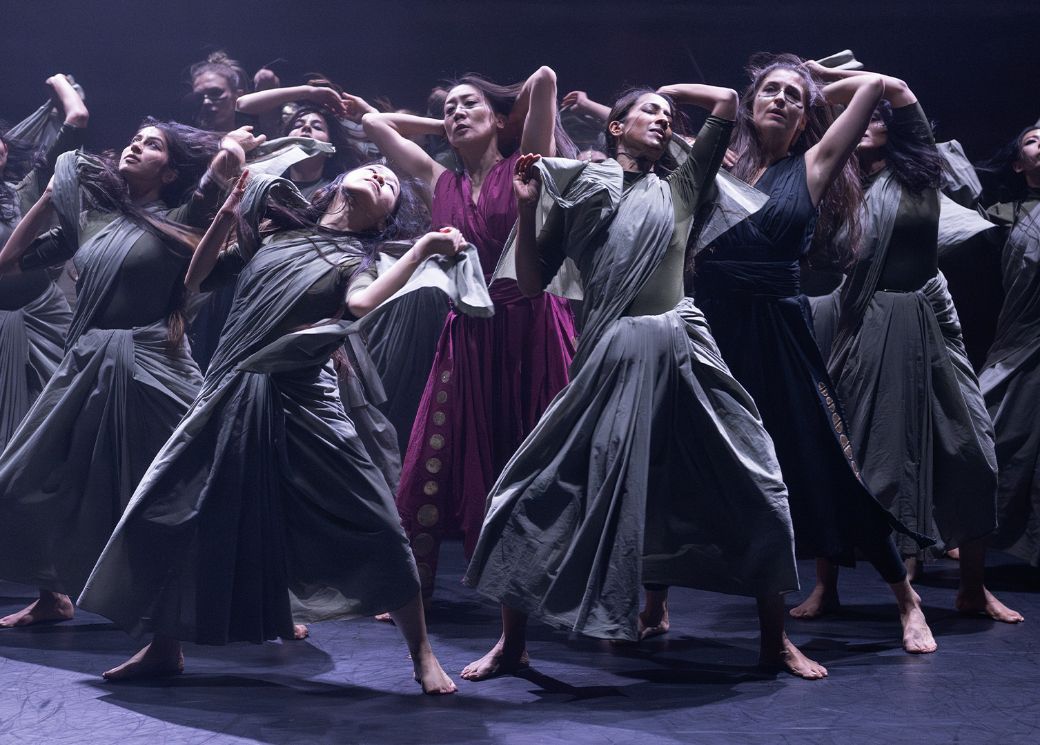There is an illusion in Thikra: Night of Remembering, Akram Khan’s newest and final piece for his Akram Khan Company, which closes after 25 years of existence. This is probably unintentional, but speaks cogently about legacy and the cultural threads that weave in and out of our stories.

A central female quartet, Ancestor, Matriarch and two sisters (one who evokes and one who serves as ritualistic vessel) seem to exchange roles. We sense something is being brought to life but we’re unsure who is who: the past becomes the future, the present becomes the aggressor, then the victim, and it all unfolds in rhythmic dynamism that at points takes your breath away for its guttural verve. A howl down the ages.
Created in response to AlUla, a beautiful, but remote region of Saudi that was key for international trade routes, Khan and Saudi artist Manal AlDowayan developed a narrative that follows the yearly ritual of a tribe of woman summoning her ancestor so she can recall their collective past: reckon with it, mourn it, release it, and then go forth. A spectral mass in white is our focus as Thikra begins. Figures flicker around her and the stage space morphs out of the nightscape of Zeynep Kepekli’s moody lighting, which journeys from infinite cavern, to desert fireside, recalling Thikra’s initial iteration as an outdoor performance in January 2025.
Khan’s choice of 12 female-presenting dancers is powerful and they each dance with an individuality that makes Thikra’s early unison sections arresting – this is a true community. The choreographer’s blend of bharatanatyam, kathak and contemporary dance is visceral; body designs speak of the earth, carving it out like clay, but this is shot through with a radiant arm gesture to contradict the low-held pelvis in deepest lunge.
I’m left with the memory of Azusa Seyama Prioville’s Matriarch physically impacting the space around her, setting the darkness chiming. These 12 women often looked like goddesses, glowing from their solar plexus, but Khan makes us understand that their imperious power comes not from the heavenly sphere, but the complete inhabitation of their corporal selves. These women’s physicality makes for a new kind of sacred feminine. An arresting motif is how this tribe use their unadorned hair in the dance – indeed the whole body is alive with rhythm in Khan’s choreography.
Pulled tight in-hand like a sword being drawn, or draped vertically for the face to travel through like a portal into the next world, I was beguiled. Ching-Ying Chien’s quietly searching dancing as the Ancestor stirred the soul, whilst Samantha Hines’ sister, surprising in her sinister physical displacement was an insidious presence, recalling darker elements of our collective consciousness. A duet for her and Chien looked liked possession, or rapture.
Dance critic Jennifer Homans has said that a dancer’s supreme technical gift is their ability to play with time, but Thikra made me think of how choreographer’s determine our feeling of pace. Khan’s handle on it here is masterful at an hour long, building unison climaxes that receded like waves and promoting the sense we were trespassing on something we shouldn’t be. The entire sound, design and scenic concept is as heavily laden with reference as the stories buried in the sands of the desert oasis that sparked this dance work.
Part of its allure is how much or how little a viewer can interpret in Thikra. You trace the story of AlUla through Aditya Prakash’s music and soundscape: Saudi rhythms, Bedouin instruments, through to Bulgarian chant and Purcell opera. It is a record of the spice road’s gift to the west, an element that reveals a more historically significant act of repair, that of processing colonialism. This amongst whatever other private trespasses this community digests in its nocturnal dance.
Thikra’s sensuous offering makes for a commanding dance, but it’s broadness of mind is actually what clouds it at points. Though a narrative is laid out for us, with a definite perspective, we might not always receive it how it was intended. Khan’s power is the concentrated colour of his dances; feet and upper body working in a polyphony of rhythm and the moments he finds an image of real beauty. At one point, a tribeswoman’s hand makes a crown atop of the Ancestor’s head. The Ancestor pulls it down to her stomach – her womb – like she’s showing its dissemination down the generations. We understand that it’s past voices shaping our present, but do we have agency to change any of it? As Akram Khan moves on to a new horizon in his artistic output, this dance-goer was enthralled by Thikra’s violent swagger; its lyrical plaintiveness amongst the excavation.


